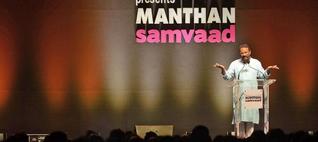Judicial system poses challenge to marginalised sections
Sharing his experience in the court room, Ramon Magsaysay award winner Bezwada Wilson said judiciary is as inaccessible to the marginalised as any government system. “This prevents the percolation of justice to the needy,” he added. For

Sharing his experience in the court room, Ramon Magsaysay award winner Bezwada Wilson said judiciary is as inaccessible to the marginalised as any government system.
“This prevents the percolation of justice to the needy,” he added.
For the common man, courts are all about winning or losing the case, said Mr. Wilson, who was speaking at Manthan Samvaad held in the city on Sunday. However, this notion is far from reality.
“At the conclusion of a case in the Supreme Court, I asked my lawyer whether we won. Later, I realised that the judicial process is lengthy and cumbersome. The oppressors take advantage of this,” said Mr. Wilson, who frequents lower courts, High Courts, and the Supreme Court to challenge the system of manual scavenging.
Speaking of the practice where men and women of certain castes are forced to manually carry night soil for disposal, Mr. Wilson said caste system is an every day reality even in modern India that discriminates a large majority of people.
Mr. Reddy said in the case of conflict of economic interest between the Centre and the States, the States are given a raw deal.
The country has so many regional differences that debates arise even in International Monetary Fund (IMF) meetings. The best way to move forward is to decentralise and better Centre-State relations, he said.
Mr. Joseph, who spoke about the exploitation of the poor and money laundering of the rich, said, “In a country which has 70 per cent rural and 30 per cent urban population, the rich elites are feasting over the poor.”
Successive governments are feeding authoritarian propaganda, which remains unquestioned in middle class homes, he added.
Read more at: http://www.thehindu.com/todays-paper/tp-national/tp-telangana/judicial-system-poses-challenge-to-marginalised-sections/article9177873.ece

